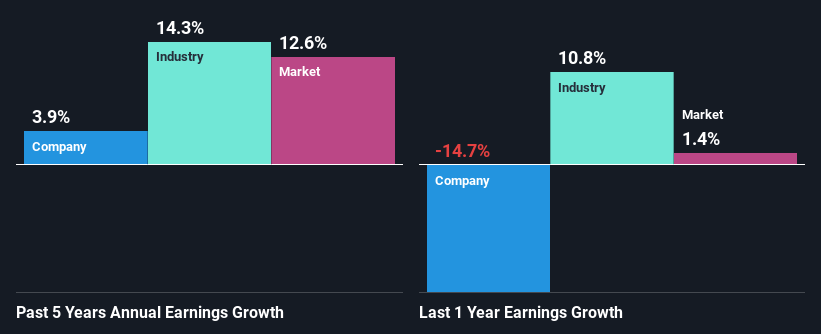- United States
- /
- Food and Staples Retail
- /
- NYSE:WMK
Weis Markets, Inc.'s (NYSE:WMK) Financials Are Too Obscure To Link With Current Share Price Momentum: What's In Store For the Stock?

Most readers would already be aware that Weis Markets' (NYSE:WMK) stock increased significantly by 13% over the past month. But the company's key financial indicators appear to be differing across the board and that makes us question whether or not the company's current share price momentum can be maintained. Specifically, we decided to study Weis Markets' ROE in this article.
Return on equity or ROE is a key measure used to assess how efficiently a company's management is utilizing the company's capital. Simply put, it is used to assess the profitability of a company in relation to its equity capital.
See our latest analysis for Weis Markets
How Is ROE Calculated?
Return on equity can be calculated by using the formula:
Return on Equity = Net Profit (from continuing operations) ÷ Shareholders' Equity
So, based on the above formula, the ROE for Weis Markets is:
6.7% = US$96m ÷ US$1.4b (Based on the trailing twelve months to September 2024).
The 'return' is the income the business earned over the last year. One way to conceptualize this is that for each $1 of shareholders' capital it has, the company made $0.07 in profit.
What Has ROE Got To Do With Earnings Growth?
Thus far, we have learned that ROE measures how efficiently a company is generating its profits. Based on how much of its profits the company chooses to reinvest or "retain", we are then able to evaluate a company's future ability to generate profits. Generally speaking, other things being equal, firms with a high return on equity and profit retention, have a higher growth rate than firms that don’t share these attributes.
A Side By Side comparison of Weis Markets' Earnings Growth And 6.7% ROE
At first glance, Weis Markets' ROE doesn't look very promising. Next, when compared to the average industry ROE of 15%, the company's ROE leaves us feeling even less enthusiastic. As a result, Weis Markets reported a very low income growth of 3.9% over the past five years.
As a next step, we compared Weis Markets' net income growth with the industry and were disappointed to see that the company's growth is lower than the industry average growth of 14% in the same period.

The basis for attaching value to a company is, to a great extent, tied to its earnings growth. The investor should try to establish if the expected growth or decline in earnings, whichever the case may be, is priced in. This then helps them determine if the stock is placed for a bright or bleak future. One good indicator of expected earnings growth is the P/E ratio which determines the price the market is willing to pay for a stock based on its earnings prospects. So, you may want to check if Weis Markets is trading on a high P/E or a low P/E, relative to its industry.
Is Weis Markets Making Efficient Use Of Its Profits?
Despite having a moderate three-year median payout ratio of 31% (implying that the company retains the remaining 69% of its income), Weis Markets' earnings growth was quite low. So there might be other factors at play here which could potentially be hampering growth. For example, the business has faced some headwinds.
Additionally, Weis Markets has paid dividends over a period of at least ten years, which means that the company's management is determined to pay dividends even if it means little to no earnings growth.
Conclusion
In total, we're a bit ambivalent about Weis Markets' performance. Even though it appears to be retaining most of its profits, given the low ROE, investors may not be benefitting from all that reinvestment after all. The low earnings growth suggests our theory correct.
Valuation is complex, but we're here to simplify it.
Discover if Weis Markets might be undervalued or overvalued with our detailed analysis, featuring fair value estimates, potential risks, dividends, insider trades, and its financial condition.
Access Free AnalysisHave feedback on this article? Concerned about the content? Get in touch with us directly. Alternatively, email editorial-team (at) simplywallst.com.
This article by Simply Wall St is general in nature. We provide commentary based on historical data and analyst forecasts only using an unbiased methodology and our articles are not intended to be financial advice. It does not constitute a recommendation to buy or sell any stock, and does not take account of your objectives, or your financial situation. We aim to bring you long-term focused analysis driven by fundamental data. Note that our analysis may not factor in the latest price-sensitive company announcements or qualitative material. Simply Wall St has no position in any stocks mentioned.
About NYSE:WMK
Weis Markets
Engages in the retail sale of food through a chain of supermarkets in Pennsylvania and surrounding states.
Flawless balance sheet established dividend payer.


